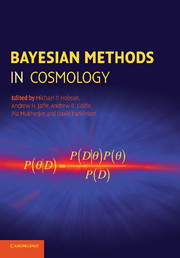Preface
Published online by Cambridge University Press: 11 April 2011
Summary
A revolution is underway in cosmology, with largely qualitative models of the Universe being replaced with precision modelling and the determination of Universe's properties to high accuracy. The revolution is driven by three distinct elements – the development of sophisticated cosmological models and the ability to extract accurate predictions from them, the acquisition of large and precise observational datasets constraining those models, and the deployment of advanced statistical techniques to extract the best possible constraints from those data.
This book focuses on the last of these. In their approach to analyzing datasets, cosmologists for the most part lie resolutely within the Bayesian methodology for scientific inference. This approach is characterized by the assignment of probabilities to all quantities of interest, which are then manipulated by a set of rules, amongst which Bayes' theorem plays a central role. Those probabilities are constantly updated in response to new observational data, and at any given instant provide a snapshot of the best current understanding. Full deployment of Bayesian inference has only recently come within the abilities of high-performance computing.
Despite the prevalence of Bayesian methods in the cosmology literature, there is no single source which collects together both a description of the main Bayesian methods and a range of illustrative applications to cosmological problems. That, of course, is the aim of this volume. Its seeds grew from a small conference ‘Bayesian Methods in Cosmology’, held at the University of Sussex in June 2006 and attended by around 60 people, at which many cosmological applications of Bayesian methods were discussed.
- Type
- Chapter
- Information
- Bayesian Methods in Cosmology , pp. xi - xiiPublisher: Cambridge University PressPrint publication year: 2009

